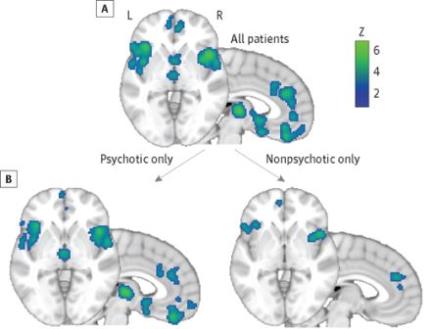Posts Tagged ‘psychiatric conditions’
News on how the brain changes over time, how to clear foggy brains, how to multitask (or not), and more
Welcome to a new edition of SharpBrains’ e‑newsletter, featuring timely brain & mental health news and a fun brain teaser to test the limits of multi-tasking. #1. Collaborative neuroimaging initiative BrainChart helps chart how brains change across the lifespan. Among the many fascinating findings: “The volume of grey matter (brain cells) increases rapidly from mid-gestation…
Read MoreMapping ‘psychedelic trips’ in the brain to better direct their therapeutic effects
For the past several decades, psychedelics have been widely stigmatized as dangerous illegal drugs. But a recent surge of academic research into their use to treat psychiatric conditions is spurring a recent shift in public opinion. Psychedelics are psychotropic drugs: substances that affect your mental state. Other types of psychotropics include antidepressants and anti-anxiety medications.…
Read MoreWhat’s normal? When it comes to the brain, it’s hard to say, and that’s why we need to study global neurodiversity
In a small village in India—a place so remote it has no electricity, no telecommunication system, and no cars or buses—a research worker prepares to place an EEG headset on a female villager’s head. The woman, who earns $3.75 a day laboring in a nearby rice paddy and who has never ventured outside her village, eyes…
Read MoreDo ADHD drugs really help college students without ADHD?
___ Over the past 15 years there has been growing awareness that many college students without an ADHD diagnosis use ADHD drugs. On some campuses, rates of self-reported non-medical use have exceeded 30% of students.
Read More10-year study finds that the higher the blood sugar level, the faster the cognitive decline over time — regardless of diabetic status
___ The Startling Link Between Sugar and Alzheimer’s (The Atlantic): “A longitudinal study, published Thursday in the journal Diabetologia, followed 5,189 people over 10 years and found that people with high blood sugar had a faster rate of cognitive decline than those with normal blood sugar—whether or not their blood-sugar level technically made them diabetic.…
Read MoreQ: What do people with schizophrenia, bipolar disorder, depression, addiction, obsessive-compulsive disorder, and anxiety have in common? A: A brain with similar gray-matter loss
. Different mental disorders cause same brain-matter loss, study finds (press release): “A meta-analysis of 193 brain-imaging studies shows similar gray-matter loss in the brains of people with diagnoses as different as schizophrenia, depression and addiction…The findings call into question a longstanding tendency to distinguish psychiatric disorders chiefly by their symptoms rather than their underlying…
Read More





